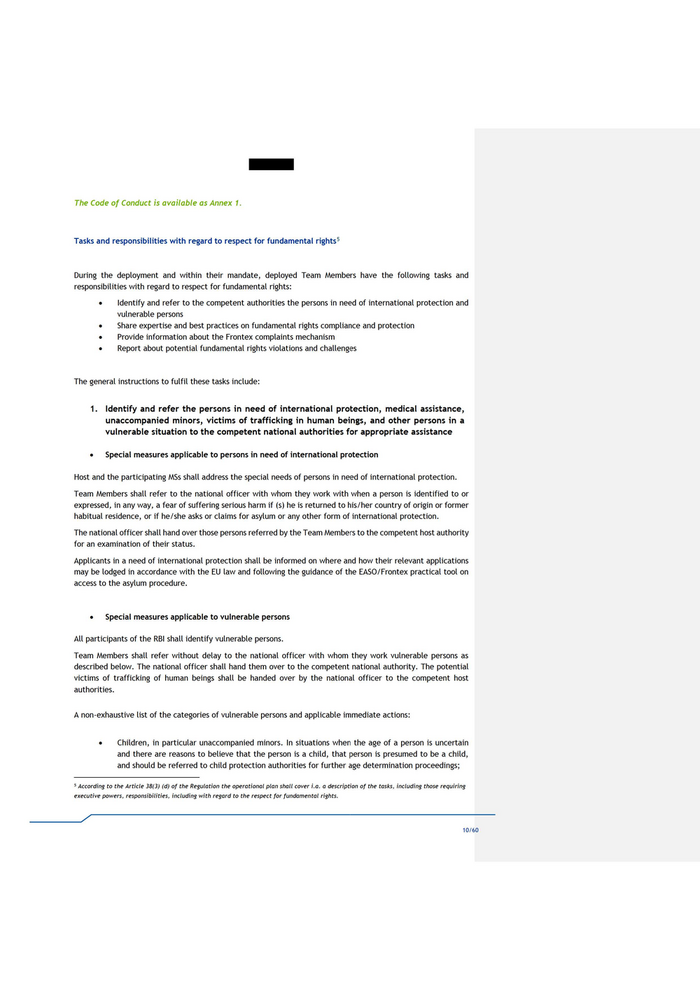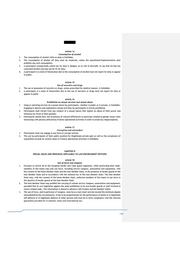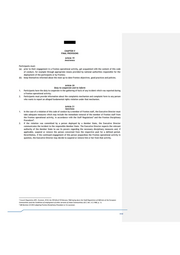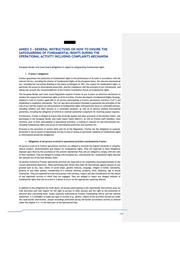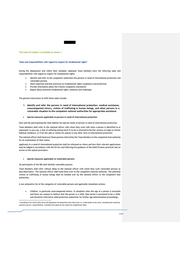imported-pad-2022-00022-documents3
Dieses Dokument ist Teil der Anfrage „Documents regarding RBI Aegean“
SZ FRONTEX EI EUROPEAN BORDER AND COAST GUARD AGENCY Warsaw, 02/07/2020 Annexes of Operational Plan Amendment No. 3 RAPID BORDER INTERVENTION AEGEAN 2020 This document is not to be disclosed to any third party without the prior consent of the European Border and Coast Guard Agency (Frontex) ME = Frontex - European Border and Coast Guard Agency www.frontex.europa.eu | Pl. Europejski 6, 00-844 Warsaw, Poland | Tel. +48 22 205 95 00 | Fax +48 22 205 95 01

= FRONTEX EI EUROPEAN BORDER AND COAST GUARD AGENCY mn Frontex - European Border and Coast Guard Agency www.frontex.europa.eu | Pl. Europejski 6, 00-844 Warsaw, Poland | Tel. +48 22 205 9500 | Fax +48 22 205 95 01

INDEX Contents ANNEX 1 - CODE OF CONDUCT APPLICABLE TO ALL PERSONS PARTICIPATING IN FRONTEX OPERATIONAL ACTIVITIES & ANNEX 2 - GENERAL INSTRUCTIONS ON HOW TO ENSURE THE SAFEGUARDING OF FUNDAMENTAL RIGHTS DURING THE OPERATIONAL ACTIVITY INCLUDING COMPLAINTS MECHANISM 9 ANNEX 3 - THOROUGH ASSESSMENT 14 ANNEX 4 - OPERATIONAL OBJECTIVES 18 ANNEX 5 - OPERATIONAL AREA 20 ANNEX 6 - DESCRIPTION OF THE TASKS AND SPECIFIC INSTRUCTIONS TO THE MEMBERS OF THE EUROPEAN BORDER AND COAST GUARD TEAMS INCLUDING RULES ON USE OF FORCE 22 ANNEX 7 - INITIAL PLAN OF DEPLOYED RESOURCES 34 ANNEX 8 - OPERATIONAL BRIEFING AND DEBRIEFING 37 ANNEX 9 - COOPERATION WITH OTHER UNION BODIES, OFFICES AND AGENCIES OR INTERNATIONAL ORGANISATIONS 39 ANNEX 10 - COORDINATION STRUCTURE 41 ANNEX 11 - JORA 52 ANNEX 12 - STANDARD OPERATING PROCEDURES (SOP) FOR THE COOPERATION BETWEEN NATO ACTIVITY AND FRONTEX COORDINATED OPERATION IN THE AEGEAN SEA 54 ANNEX 13 - DATA PROTECTION REQUIREMENTS FOR THE RAPID BORDER INTERVENTION 57 3/60

ANNEX 1 - CODE OF CONDUCT APPLICABLE TO ALL PERSONS PARTICIPATING IN FRONTEX OPERATIONAL ACTIVITIES CHAPTER I GENERAL PROVISIONS Article 1 Application, scope and objectives 1. This code of conduct applies to all Frontex operational activities, including those which take place outside the territory of the Union and, subject to paragraph 2, to all persons participating in them. 2. The basic principles set out in this code of conduct should serve as a framework for persons who are seconded national experts, other law enforcement officers or officers or participants from third countries. This code of conduct is without prejudice to the provisions of any status agreement pursuant to Article 54 of the European Border and Coast Guard Regulation?. 3. This code of conduct aims to promote general values intended to guarantee the principles of the rule of law and respect for fundamental rights with particular focus on vulnerable persons, as well as on persons seeking international protection, and is applicable to all persons participating in Frontex operational activities. Article 2 Definitions For the purpose of this code of conduct, the following definitions apply: (a) The term ‘participant’ refers to any person participating or engaged in a Frontex operational activity. (b) The term ‘Frontex operational activity’ means any activity coordinated, assisted, financed or co- financed by Frontex in the context of assisting Member States in undertaking border control and return tasks, in accordance with Article 8 of the European border and coast guard regulation. Frontex operational activities include joint operations, pilot projects, return operations and training of relevant staff. (c) The term ‘law enforcement officers’ includes members of the European Border and Coast Guard teams and/or relevant staff from the Member States and/or from third countries, who have law enforcement prerogatives. (d) The term ‘vulnerable persons’ may include women, children (unaccompanied or with family members), persons with disabilities, the elderly, victims of torture or trauma, persons susceptible to exploitation and victims of exploitation or trafficking in human beings. (e) The term ‘Member State’ also includes the Schengen associated countries. (f) The term ‘discrimination’ means any unequal treatment or arbitrary action or distinction based on a person’s sex, race, colour, ethnic or social origin, genetic features, language, religion or belief, nationality, political or any other opinion, membership of a national minority, property, birth, disability, age or sexual orientation or other status. (89) The term ‘harassment’ means intentional behaviour which is unwanted by the person to whom it is directed and which has the purpose or effect of offending that person or creating an intimidating, hostile or offensive environment. (h) The term ‘social media’ includes blogs, business networks, social networks, forums, photo sharing, products/services review, social bookmarking, social gaming, video sharing and virtual worlds. 2 Pursuant to Article 54 of Regulation (EU) 2016/ 1624 of the European Parliament and of the Council of 14 September 2016 on the European Border and Coast Guard (OJ L 251, 16.09. 2016, p. 1), a status agreement shall be concluded by the Union with the third country concerned in cases where it is envisaged that teams will be deployed to a third country in actions where the team members will have executive powers, or where other actions in third countries require it. 4 4/60

CHAPTER Il PRINCIPLES Article 3 Lawfulness 1. Participants must: a) comply with international law and Union law as well as the national law of both home and host Member States; b) meet the obligations imposed upon them by the provisions stated in the operational/implementation plan. Article 4 Fundamental rights Participants must: (a) Promote, respect, fulfil and protect human dignity and the fundamental rights of every individual, regardless of their sex, race, colour, ethnic or social origin, genetic features, language, religion or belief, nationality, political or any other opinion, membership of a national minority, property, birth, disability, age or sexual orientation or other status, with particular focus on vulnerable persons; (b) ensure respect for the relevant international and European instruments regarding fundamental rights protection, including the asylum acquis. Article 5 International protection Participants must: (a) Promote, respect, fulfil and protect the right of persons seeking international protection to be identified, receive adequate assistance and be informed in an appropriate way, preferably using a number of the most common languages that third-country nationals understand or are reasonably believed to understand, about their rights and relevant procedures; (b) ensure that persons in (a) above must be referred without delay to the national authorities responsible for considering their requests, in compliance with the principle of non-refoulement, the prohibition against arbitrary and collective expulsions and the right to seek asylum; (c) ensure that persons in their custody are treated in accordance with the right to human dignity, and are provided with basic necessities, including food, water, shelter and medical attention to meet their individual needs; (d) ensure that special consideration is given to vulnerable persons as well as to persons seeking international protection. Article 6 Performance of duties Participants must: a) ensure that instructions, directives and required duties given to them are carried out promptly and in accordance with the training received on the protection of fundamental rights; b) display that they are on a Frontex operational activity, unless such transparency would compromise either their personal safety or duly justified operational objectives; c) use resources put at their disposal responsibly and avoid unnecessary waste: such resources may include mobile offices, cars, computers or phones. Article 7 Responsibility Participants are primarily responsible for all the actions in the context of their participation in a Frontex operational activity. Any breach of the participants’ legal obligations or this code of conduct, or any failure by 5/60

those participants to refer or report any suspected breaches of this code of conduct, should be reported using the appropriate channels. Article 8 Conflict of interests Participants must refrain from any activities which would undermine or compromise their impartiality and the appropriate performance of their duties. Article 9 Confidentiality 1. The processing of personal data by participants must comply with the applicable Union as well as national data protection law. 2. Participants must not record any aspect of Frontex operational activities for private use. Professional information in the possession of a participant in current, past or planned Frontex operational activities must not be publicly disclosed, including on social media, unless the performance of the duty strictly requires disclosure, or such disclosure has been appropriately authorised in accordance with the applicable standards. 3. _Participants must not express themselves regarding current, past and planned Frontex operational activities in the media, including social media, unless explicit authorisation is given, in accordance with the operational/implementation plan or other similar agreed rules. Article 10 Behavioural Standards Participants, whether on or off duty, must: (a) not behave in a way likely to compromise the prestige and the nature of the public mission in which they are invested, or to bring discredit upon their organisation, entity or Frontex; (b) act with fairness, impartiality and non-discrimination and treat all persons with dignity, courtesy and respect; (c) not take any actions contrary to public order; (d) not use vulgar, obscene or otherwise offensive speech or gestures that could be considered abusive; (e) not be ignorant of cultural differences when interacting with persons so as to cause misunderstandings. CHAPTER Ill PROHIBITED CONDUCTS Article 11 Prohibition of abuse of authority and position All improper use of a position of influence, power or authority is forbidden. Article 12 Non-Discrimination All forms of discrimination as defined in Article 2(f) towards persons participating in, involved in or otherwise affected by Frontex operational activities, or the general public is forbidden. Article 13 Prevention of harassment All forms of harassment as defined in Article 2(g) towards persons participating in, involved in or otherwise affected by Frontex operational activities, or the general public is forbidden. 4: 6/60

Article 14 Consumption of alcohol 1. The consumption of alcohol while on duty is forbidden. 2. The consumption of alcohol off duty must be moderate, unless the operational/implementation plan prohibits any such consumption. 3. A participant unexpectedly called out for duty is obliged, at no risk of discredit, to say that he/she has consumed alcohol and may not be fit for duty. 4. Aparticipant in a state of intoxication due to the consumption of alcohol must not report for duty or appear in public. Article 15 Use of narcotics and drugs 1. The use or possession of narcotics or drugs, unless prescribed for medical reasons, is forbidden. 2. A participant in a state of intoxication due to the use of narcotics or drugs must not report for duty or appear in public. Article 16 Prohibition on sexual services and sexual abuse 1. Using or soliciting services of a sexual nature by participants, whether in public or in private, is forbidden. Engaging in abusive and exploitative sexual activities by participants is strictly prohibited. 2. Participants shall refrain from any conduct of a sexual nature that implies an abuse of their power and influence by virtue of their position. 3. Participants should show full awareness of cultural differences in particular related to gender issues when interacting with persons affected by Frontex operational activities in order to avoid any misperceptions. Article 17 Corruption and misconduct 1. _Participants must not engage in any form of corrupt activity. 2. The use by participants of their public position for illegitimate private gain as well as the acceptance of unjustified rewards for actions taken in Frontex operational activities is forbidden. CHAPTER IV SPECIAL RULES AND PRINCIPLES APPLICABLE TO LAW ENFORCEMENT OFFICERS Article 18 Use of force and weapons 1. _ Pursuant to Article 40 of the European border and coast guard regulation, while performing their tasks, members of the teams may only use force, including service weapons, ammunition and equipment, with the consent of the home Member State and the host Member State, in the presence of border guards of the host Member State and in accordance with the national law of the host Member State. The host Member State may, with the consent of the home Member State, authorise members of the teams to use force in the absence of border guards of the host Member State. 2. The host Member State may prohibit the carrying of certain service weapons, ammunition and equipment, provided that its own legislation applies the same prohibition to its own border guards or staff involved in return-related tasks. This information is shared in advance with Frontex and the Member States. 3. The use of force, and in particular of weapons, must be as a last resort and not exceed the minimum degree necessitated by the circumstances. It has to be proportionate for the performance of duties or in legitimate self-defence or in legitimate defence of other persons and must be in strict compliance with the relevant guarantees provided for in national, Union and international law. 4: 71/60

CHAPTER V FINAL PROVISIONS Article 19 Awareness Participants must: (a) prior to their engagement in a Frontex operational activity, get acquainted with the content of this code of conduct, for example through appropriate means provided by national authorities responsible for the deployment of the participants or by Frontex; (b) keep themselves informed about the most up-to-date Frontex objectives, good practices and policies. Article 20 Duty to cooperate and to inform 1. Participants have the duty to cooperate in the gathering of facts of any incident which was reported during a Frontex operational activity. 2. Participants must provide information about the complaints mechanism and complaint form to any person who wants to report an alleged fundamental rights violation under that mechanism. Article 21 Sanctions 1. Inthe case of a violation of this code of conduct by a member of Frontex staff, the Executive Director must take adequate measures which may include the immediate removal of the member of Frontex staff from the Frontex operational activity, in accordance with the Staff Regulations? and the Frontex Disciplinary Procedure®. 2. If the violation was committed by a person deployed by a Member State, the Executive Director communicates the incident to the responsible Member State. The Executive Director expects the relevant authority of the Member State to use its powers regarding the necessary disciplinary measures and, if applicable, suspend or remove the person concerned from the respective pool for a defined period. Nevertheless, if the continued engagement of this person jeopardises the Frontex operational activity in question, the Executive Director may decide to suspend or remove him or her from that activity. 3 Council Regulation (EEC, Euratom, ECSC) No 259/68 of 29 February 1968 laying down the Staff Regulations of Officials of the European Communities (and the Conditions of employment of other servants of those Communities) (OJ L 561, 4.3.1968, p. 1). 4 MB Decision 23/2012 adopting Frontex Disciplinary Procedure or its successor. 4 8/60
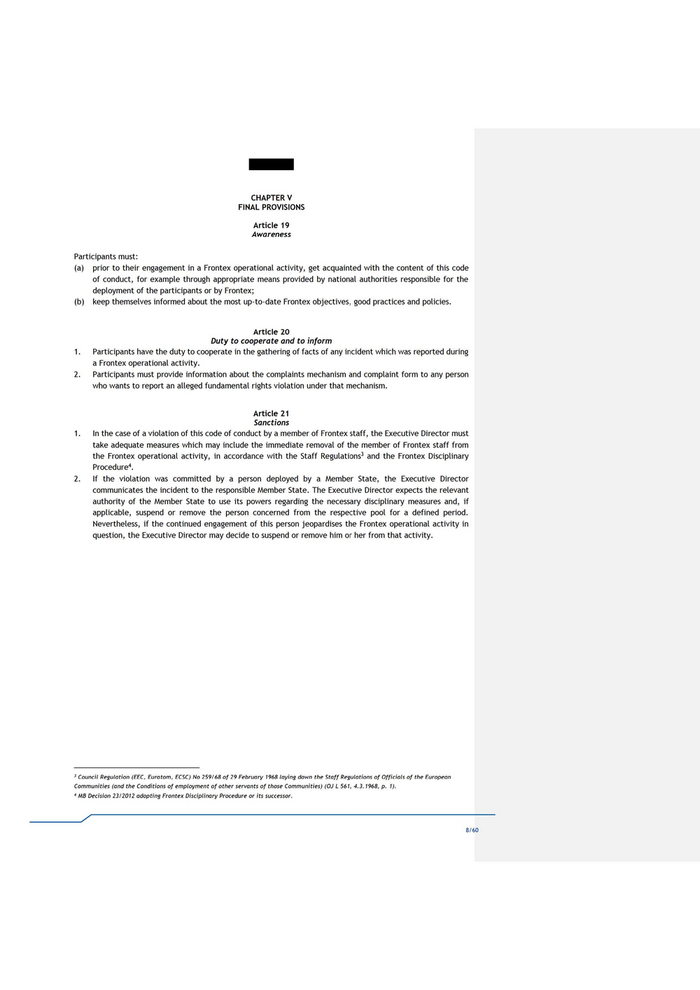
ANNEX 2 - GENERAL INSTRUCTIONS ON HOW TO ENSURE THE SAFEGUARDING OF FUNDAMENTAL RIGHTS DURING THE OPERATIONAL ACTIVITY INCLUDING COMPLAINTS MECHANISM European Border and Coast Guard obligations in regard to safeguarding fundamental rights « Frontex’s obligations Frontex guarantees the protection of fundamental rights in the performance of its tasks in accordance with the relevant EU law, including the Charter of Fundamental Rights of the European Union, the relevant international law, including the Convention Relating to the Status of Refugees of 1951, the respect for fundamental rights, in particular the access to international protection, and the compliance with the principle of non-refoulement, and taking into account the recommendations of the Frontex Consultative Forum on fundamental rights. The European Border and Coast Guard Regulation requires Frontex to put in place an effective mechanism to monitor the respect for fundamental rights in all its activities. Frontex developed a Fundamental Rights Strategy, adopted a Code of Conduct applicable to all persons participating in Frontex operational activities (“CoC”) and established a complaints mechanism. The CoC lays down procedures intended to guarantee the principles of the rule of law and the respect for and promotion of fundamental rights with particular focus on vulnerable persons, including children and other persons in a vulnerable situation, as well as on persons seeking international protection, including the obligation of referral to national authorities competent for receiving asylum requests. Furthermore, Frontex is obliged to ensure that all border guards and other personnel of the Member States, who participate in the European Border and Coast Guard Teams (EBCGT), as well as Frontex staff members, have received, prior to their participation in operational activities, a training in relevant EU and international law, including fundamental rights and access to international protection and maritime law. Pursuant to the provisions of Article 46(4) and (5) of the Regulation, Frontex has the obligation to suspend, terminate or not to launch its operational activity in case of serious or persistent violations of fundamental rights or international protection obligations. « Obligations of all persons involved in operational activities coordinated by Frontex All persons involved in Frontex operational activities are obliged to maintain the highest standards of integrity, ethical conduct, professionalism and respect for fundamental rights. They are expected to meet obligations imposed upon them by the provisions of the present Operational Plan and are obliged to comply with the rules of their mandates. They are obliged to comply with European law, international law, fundamental rights and also the national law of the host Member State. All persons involved in Frontex operational activities are expected to act responsibly and proportionately to the current operational objectives. While performing their duties they shall not discriminate against persons on any grounds such as sex, race, ethnic or social origin, genetic features, language, religion or belief, nationality, political or any other opinion, membership of a national minority, property, birth, disability, age or sexual orientation. They are expected to treat every person with courtesy, respect and due consideration for the nature of any legitimate activity in which they are engaged. They are obliged to report any alleged violation of fundamental rights that has occurred or is about to occur via the appropriate reporting channel. In addition to the obligations set forth above, all persons participating in the rapid border intervention must act with discretion and with respect for the right to privacy of other persons and the right to the protection of personal data concerning them. Unless explicitly authorized by Frontex Coordinating Officer and the national authorities, it is forbidden to make any type of records (e.g., photos, videos) of the activities carried out under the rapid border intervention, except recordings performed during the border surveillance activity as defined under the chapter 4.3.1 in the Main part of the Operational Plan. 4: 9/60
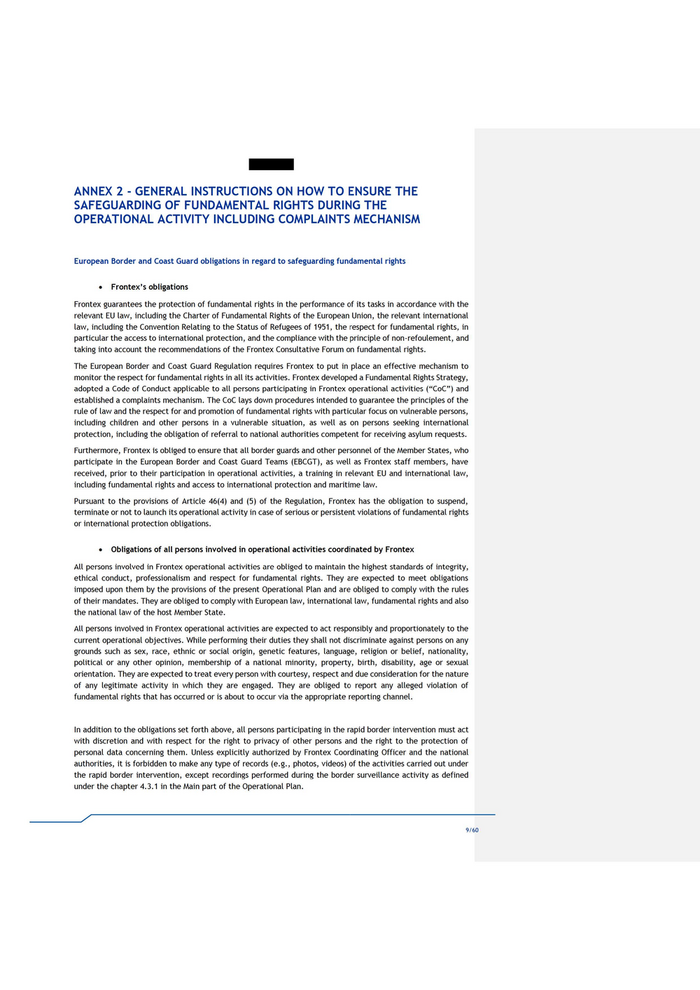
The Code of Conduct is available as Annex 1. Tasks and responsibilities with regard to respect for fundamental rights? During the deployment and within their mandate, deployed Team Members have the following tasks and responsibilities with regard to respect for fundamental rights: . Identify and refer to the competent authorities the persons in need of international protection and vulnerable persons . Share expertise and best practices on fundamental rights compliance and protection . Provide information about the Frontex complaints mechanism . Report about potential fundamental rights violations and challenges The general instructions to fulfil these tasks include: 1. Identify and refer the persons in need of international protection, medical assistance, unaccompanied minors, victims of trafficking in human beings, and other persons in a vulnerable situation to the competent national authorities for appropriate assistance «e Special measures applicable to persons in need of international protection Host and the participating MSs shall address the special needs of persons in need of international protection. Team Members shall refer to the national officer with whom they work with when a person is identified to or expressed, in any way, a fear of suffering serious harm if (s) he is returned to his/her country of origin or former habitual residence, or if he/she asks or claims for asylum or any other form of international protection. The national officer shall hand over those persons referred by the Team Members to the competent host authority for an examination of their status. Applicants in a need of international protection shall be informed on where and how their relevant applications may be lodged in accordance with the EU law and following the guidance of the EASO/Frontex practical tool on access to the asylum procedure. «e Special measures applicable to vulnerable persons All participants of the RBl shall identify vulnerable persons. Team Members shall refer without delay to the national officer with whom they work vulnerable persons as described below. The national officer shall hand them over to the competent national authority. The potential victims of trafficking of human beings shall be handed over by the national officer to the competent host authorities. A non-exhaustive list of the categories of vulnerable persons and applicable immediate actions: «e _ Children, in particular unaccompanied minors. In situations when the age of a person is uncertain and there are reasons to believe that the person is a child, that person is presumed to be a child, and should be referred to child protection authorities for further age determination proceedings; 3 According to the Article 38(3) (d) of the Regulation the operational plan shall cover i.a. a description of the tasks, including those requiring executive powers, responsibilities, including with regard to the respect for fundamental rights. 4 10/60
